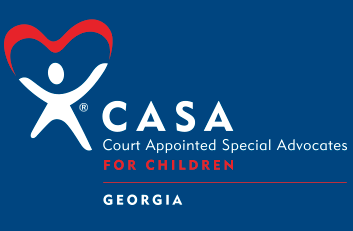
Get Involved
Help improve the lives of children in foster care in your community by getting involved with CASA.
Become a CASA Volunteer
CASA volunteers are everyday people from all walks of life who do exceptional work. They are trained to advocate for the well-being of Georgia’s children experiencing foster care and are appointed by the court to advocate for each child’s best interest. That’s their sole purpose.
What does a CASA volunteer do?
CASA volunteers:
- Establish a stable, one-on-one relationship with a child in foster care and get to know the child’s unique history
- Gather information from anyone who can shed light on the child’s situation – teachers, foster parents, family members, physicians, etc.
Help the child plan and develop age-appropriate goals
- Ensure the child has access to needed medical, education, career, and housing services
Attend court proceedings (usually every six months) and make an informed, independent recommendation to the judge to improve the child’s experience while in foster care and his/her overall well-being
- Bring a sense of urgency to the child’s needs and promote safety
- Advocate for timeliness and permanency for children involved in juvenile court proceedings
Remain involved until the case is permanently resolved to keep the focus on the child
Learn more about a CASA volunteer’s role and purpose
Check out this brief video about becoming a CASA volunteer
Check out some frequently asked questions
“Children are in need of dreams; children entering juvenile court have no dreams or hope for the future. CASA gives them that hope and helps them to understand that what has happened to them is not their fault; they are not defective or substandard. CASA volunteers are there to help a child rise above it all.”
Five Steps to Make a Difference
The actions of a single person — a CASA volunteer — can mean everything to a child in foster care. A child with a CASA is more likely to receive needed services and be placed in a safe, permanent home when reunification isn’t likely. CASA volunteers make a difference every day. You can, too. Become a volunteer.
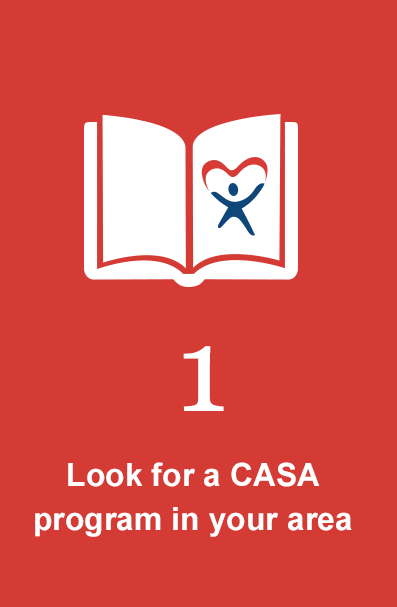
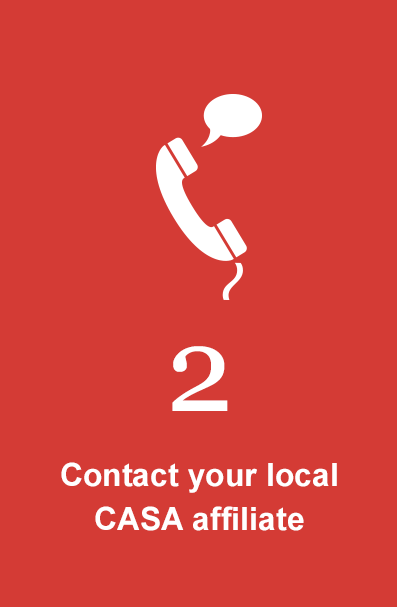
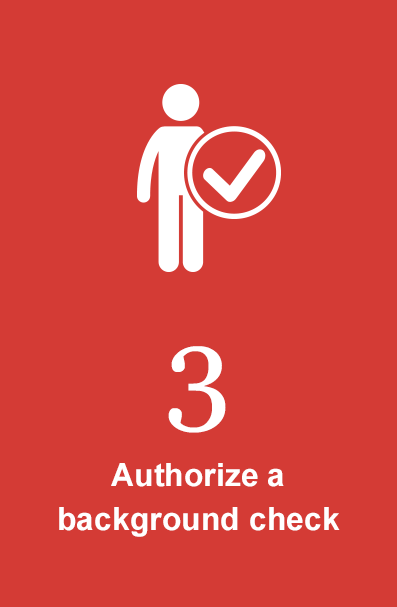
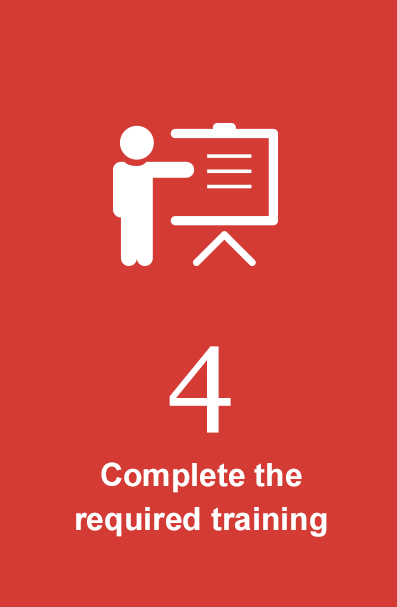

FAQ’s
No. CASA volunteers are everyday citizens from all walks of life who care about children and their welfare. Your common sense, life experience, and desire to help is all you need to begin. You will be receiving special training and supervision to ensure you have a complete understanding of your role before you are assigned a case.
Once children and youth are taken into DFCS (Department of Family and Children Services) custody, their cases are overseen by judges in the juvenile courts who appoint CASA volunteers to focus on the child and provide recommendations to improve a child’s experience while in foster care, as well as the child’s overall well-being.
Social workers are employed by the state and often assigned many cases at a time. The social worker is responsible for helping an entire family, which includes setting up individual services for family members. A CASA volunteer is the advocate for the child, is not paid, works with only a few cases at a time, and does not set up services. The CASA volunteer does not replace the social worker on a case; he or she is an independent officer of the court and works within the child welfare system to improve children’s experiences while in foster care.
CASA volunteers are only appointed to children who have come to the attention of the juvenile court system due to abuse or neglect. Like a mentoring program, the CASA volunteer does develop a relationship with the child through frequent contact; however, the primary role of the CASA volunteer is to gather information about the child, write reports to the court, and attend court hearings. The CASA program is not a mentoring program.
Program Training
A schedule of upcoming Volunteer Training sessions appears below for affiliate CASA programs that have requested to be listed. If you don’t see a particular program listed, please contact the program directly.
Chattahoochee CASA
1225 Third Ave.
Columbus, GA 31907
Tifany Manning-Hunter
706-327-9612 ext. 1511
Website
Flex Training (in-person + online)
Thursdays from August 21 – September 25
Dougherty CASA
1909 Aberdeen Rd., Suite 108
Albany, GA 31701
Zoye Thomas
470-242-1364
Website
Flex Training (in-person + online)
Mondays from June 2 – July 21
5:30 – 8:30 p.m.
Classroom Training
Saturdays from September 6 – 27
9:30 a.m. – 3:30 p.m.
Orientation Contact:
Justine Ferreira
404-292-8291
Orientations (online)
To be posted
Training Contact:
Email
404-378-0038
Online Trainings
Thursdays from 4 – 7 p.m.
Late Summer/Early Fall: August 7, 14, 21, September 4 and 11
Fall: October 9, 16, 23, November 6 and 13
Renita Clarke
901-496-6164
Website
Training
Starting in September – flex or online training
Carroll County CASA
110 Dixie St., Suite 100
Carrollton, GA 30117
Kayla Castillo
770-838-1964
Website
Flex Training (in-person + online)
Mondays from July 7 – August 4
5:30 – 8:30 p.m.
Dianna Dillard
404-859-7174
Website
Online Trainings
August 2025
Opens August 13
Classes: August 18 – September 17
Wednesdays from 6 – 9 p.m.
September 2025
Opens September 11
Classes: September October 16
Thursdays 6 – 9 p.m.
Wimberly Center for Community Development
163 MLK Jr. Dr.
Winder, GA 30680
Kristen Romanowski
770-601-6840
Website
Flex Training (in-person + online)
Late Summer / Early Fall:
August 21 – September 25
Thursdays from 6 – 9 p.m.
Advocates for Children
857 Joe Frank Harris Pkwy.
Cartersville, GA 30120
Alicia Newton
770-387-1143 ext. 238
Website
Classroom Training
Tuesdays beginning September 9
5:30 – 8:30 p.m.
Pearson, GA 31642
Victoria Merritt
229-686-6576 ext. 4
Website
Classroom Training
Wednesdays from June 4 – July 16
11 a.m. – 2 p.m.
470-330-9914
Website
Online Training
Thursdays from June 12 – July 24 (except week of July 4)
5:30 – 8:30 p.m.
CASA Office, Gilmer County Courthouse
1 Broad St.
Ellijay, GA 30540
Jason Turner
706-276-2272
Website
Information Sessions
2nd Wednesday of each month
10 a.m. – 12 noon
Beth Morris
478-238-6318 x103
Website
Online Training
Begins June 2
Towaliga CASA
101 Commerce Pl., Suite 3
Barnesville, GA 30204
Fawn Greer
770-601-4669
Website
Classroom Training
Thursdays from July 24 – September 4
5:30 – 8:30 p.m.
Ericka McClam
770-619-6015
Website
Online Orientation
Monday, July 14 from 6 – 7:30 p.m.
Trainings
Summer:
Tuesdays and Thursdays from June 24 – July 24 (except July 1 and 3)
4 – 7 p.m.
Swearing-in on August 27
Fall:
Wednesdays from September 10 – October 8
6 – 9 p.m.
Swearing-in on October 29
Hannah Manns
478-662-2969
Online Training
Thursdays from July 10 – August 14
6 – 9 p.m.
Family Support Council
1529 Waring Rd.
Dalton, GA 30720
Tracy Harmon
706-428-7931
Website
Classroom Training
Tuesdays beginning June 17
5:30 – 9 p.m.
Major Events
August 23, 2025
Save the date for the annual Georgia CASA Conference at the Renaissance Atlanta Waverly Hotel & Conference Center. Click here to visit the event page for more information.
